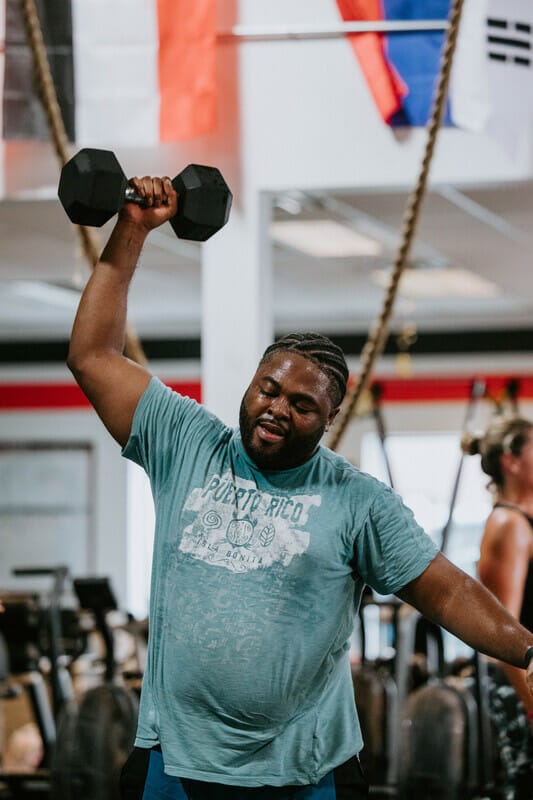The weather is starting to change. The mornings are getting crisp. Kids are back in school. The busy schedules resume and the life of going from one thing to the next is the everyday norm. It’s easy to break the routine of going to the gym or preparing quality meals.
But it’s still just as important, if not more. Maintaining that healthy routine and lifestyle will help you in that busy, stressful life.
How do you stay motivated, keep the routine, and make good choices?
I’ll let you in on a little secret. Fit people don’t “want it more.”
High level CrossFitters have the same struggles with daily and consistent motivation.
So, what’s the difference? Why are they so fit and the average person feels like they can’t “get there”? I’m confident that if you polled the top 10% in CrossFit, the NBA, NFL, Olympics or any other high level sport that they’d say they don’t feel like training or working out every day.
That shredded guy you see at the grocery store? Oh yea, he definitely wants brownies and ice cream just like you do.
So why do they look different? How do they continue to work out or push through those tough temptations? They know how to get that injection of inspiration and how to push through the days of low motivation.
Here are some ways those athletes stay motivated. The GREAT NEWS is that they carry over to the fitness enthusiast and the every day gym goer.

- They trust a coach to guide them.
Everyone, including trainers, coaches and you, need to be accountable to someone else – a third party that won’t let them slide. Even coaches have coaches. Your wife will still love you whether you are fit or not. Your buddy at work actually doesn’t care if you get that double bodyweight back squat. Your golf buddy would rather you hit 18 holes with him versus being in the gym. A coach and training partner are great for helping point out those daily little wins. “You got 10 reps! Last time you could only get 6!” An in-person coach will be able to see the small daily things that you can’t. Pointing out these small wins helps people stay motivated.
You need a coach to:
- Take away the mystery. Someone that knows WHAT the plan is and WHY those steps matter.
- Coordinate results. Keep you progressing in a straight line and make adjustments when needed.
- Hold you accountable. Your coach knows when you show up and when you don’t, and they’ll call you out when you need to step up in ways that apps cannot.



2. They understand that consistency is the key to lasting results.
In an era of instant gratification, we want the low hanging fruit or quick reward. If we don’t see results quickly, we lose motivation. Consistent efforts result in little wins that add up to big changes. Consistency creates a pattern and habits that will last longer than the “quick tips and tricks” to achieve your goals. The behaviors you are consistent with will eventually become mindless habits. It’ll be the norm to go to the gym and prepare your meals. It will become expected to exercise. It’ll be easier to resist tempting foods. Certain days will be high motivation and intense training sessions. It WILL get easier, but only if you push through the early, unmotivated days. Typically, it takes around 60-90 days for our behaviors to become habits, and then a couple more weeks for our habits to become “just what we do.” Soon, those short term goals you set become long term plans.
3. They understand that real progress takes time
A short-term, narrowed focus on a specific goal is great for consistently putting in the effort. However, people often fall off when their goal is achieved. For example, say your goal is to lose ten pounds, and for the next 2 weeks you only eat cottage cheese, pineapples and celery. You’ll absolutely lose weight. But what did you learn? Nothing. You starved yourself, created a bad relationship with food and your scale. Quick-fixes don’t lead to lasting results.
Instead of looking for a quick fix that is unsustainable, hire a nutrition coach, learn to weight and measure your food, and slowly lose 1-2lbs a week by eating the right fuel for your body. It is better to lose that 10lbs over 4-5 weeks and build habits that can be used day in and day out. These same habits you will adapt can be returned to when motivation gets low again or when challenges arise, such as when faced with food temptations and busy schedules during the holiday season.
Short cuts and fads create a false sense of hope and can cause long-term damage to your psychological relationship with food which puts you in a worse situation than you started. Consider working with a coach who has experience and education to help you on the road to success the correct way. Keep in mind that you do not have to do this alone. There are experts who are ready to help you live your best life.

4. They record data and use tools to plan
Write down your workouts. Note your personal records. Track your food intake. Write down your wins. Log your sleep.
Having this essential data will help you (and your coach) figure out why you could be feeling a certain way.
Things can have a domino effect, good and bad. For example, I find that if I go to bed late, I feel weak in my workouts. Then, I try to make up for it with caffeine which causes me to crash and snack on sugary vending machine foods. Those snacks make me feel sluggish on my way home from work. Then, I’m unmotivated to prepare a good meal for dinner, have poor sleep and the cycle continues.
Many apps exist to help with the data collection process. For example, MyFitnessPal or NutritionIX help manage nutrition, while Beyond The White Board allows you to preview your old numbers before you show up to class or a training session.
Believe me: having the data is far better than winging-it and wishing you have done something different.
5. They track their progress.
The other benefit of utilizing apps (or old fashioned paper and pencil) to record your progress, is that the results and progress will be obvious. On your down days where motivation is lacking, this will help uplift your mood and mindset.
Unfortunately, you’re not going to PR or feel great on every workout. That’s the dream, but the reality is that consistency matters more than the peaks and valleys. People who do the little things day in and day out will last longer and have more success than those who just show up when they are “motivated”. Utilizing apps to track your progress will show the ways your data is trending, and you should see patterns of improvement towards your goals. If not, this data will also direct you to where changes need to be made.
People who cut corners and look for the magic pill can get really fast results. Then once it runs out, or they stop the intense, unsustainable routine, then they go back to their old ways and once again are unhappy with how they look and feel. Instead of giving up and chasing the quick fix, consider these ways to tap into your resources and continue moving forward.
If you get nothing else from this article, remember this: Consistency will carry you through the times motivation abandons you.
Consistent, imperfect action always wins.
Nick Carignan
CrossFit 8 Mile
